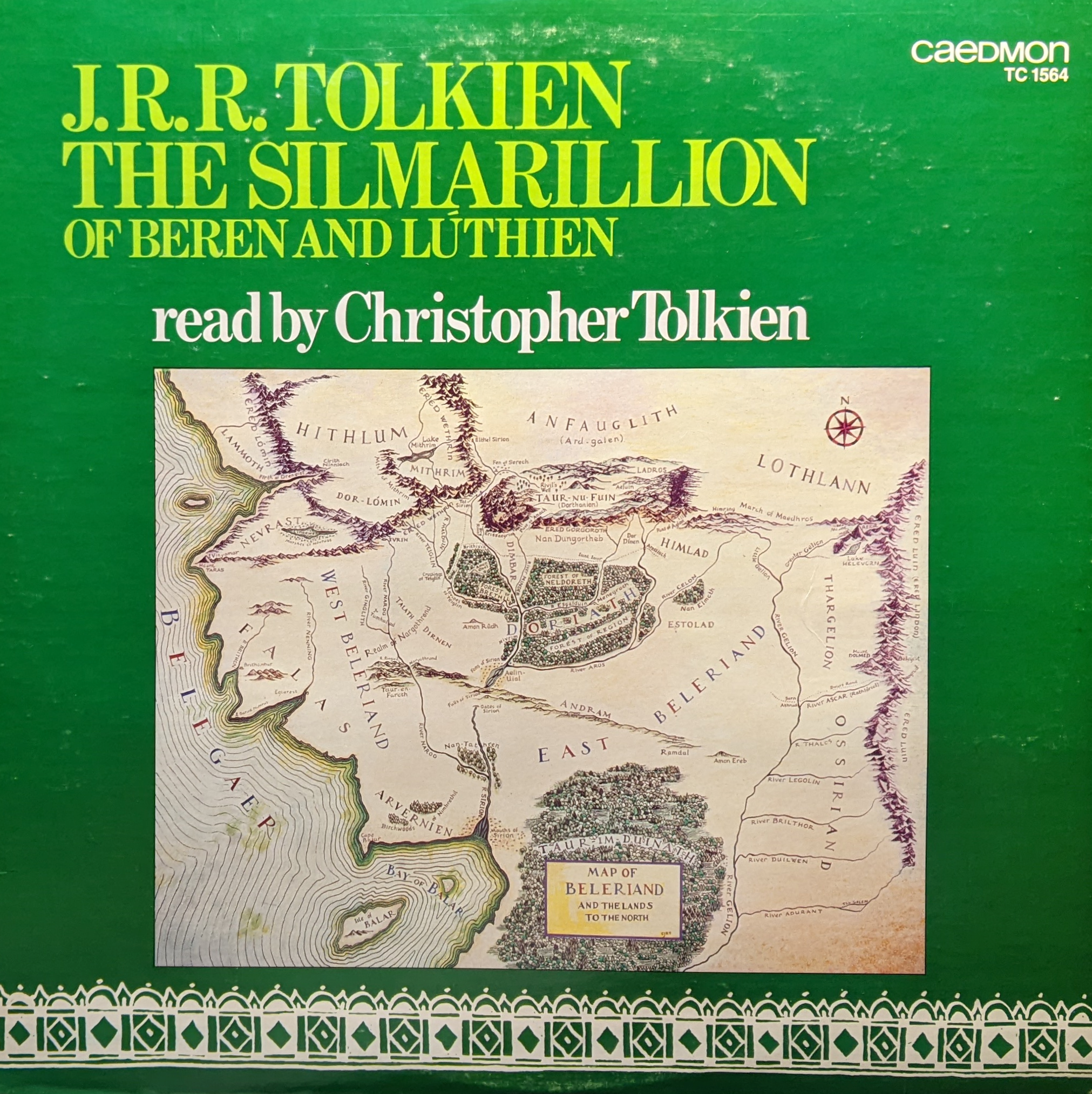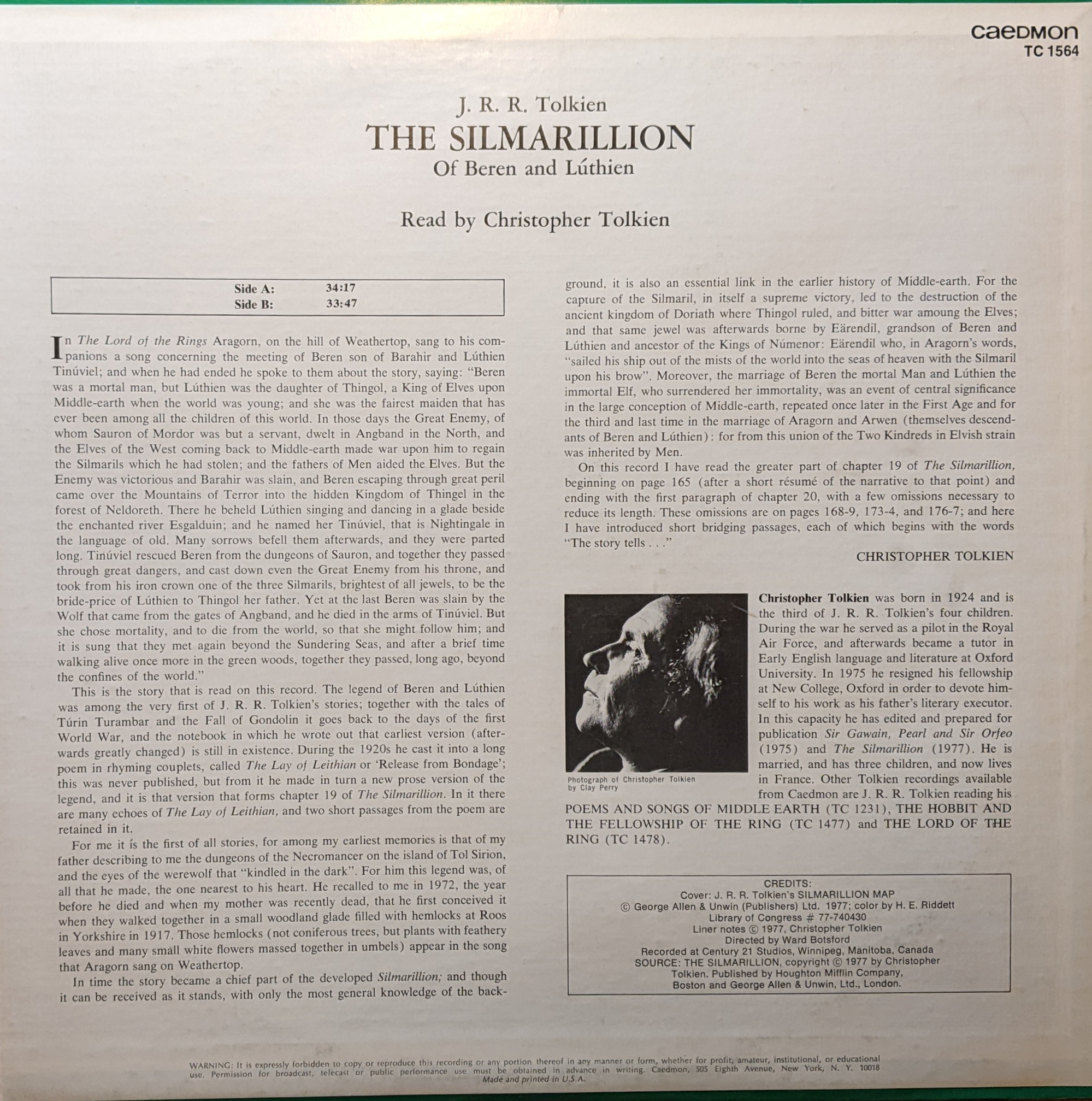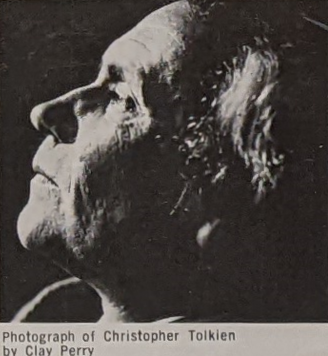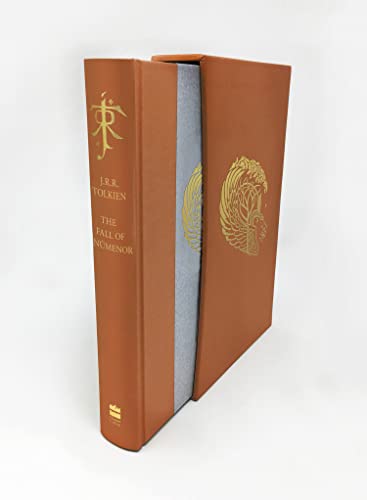Audio and Video Materials >> J.R.R. Tolkien Read By Christopher Tolkien – The Silmarillion Of Beren And Luthien vinyl
J.R.R. Tolkien Read By Christopher Tolkien – The Silmarillion Of Beren And Luthien vinyl
16 Apr, 2023
(edited)
2023-4-16 4:49:28 AM UTC
2023-4-16 4:49:28 AM UTC
I recently acquired a copy of Beren and Luthien read by Christopher Tolkien. Read masterfully by CJRT, it was released in 1977 by Caedmon Records.
I have taken high resolution pics of this title as none were to be found online. Also, I have transcribed the liner notes written by Christopher.
Discogs entry for this title
-
The Silmarillion
OF BEREN AND LUTHIEN
Read by Christopher Tolkien
Caedmon Records TC 1564, 1977
-
In The Lord of the Rings Aragorn, on the hill of Weathertop, sang to his companions a song concerning the meeting of Beren son of Barahir and Luthien Tinuviel; and when he had ended he spoke to them about the story, saying: "Beren was a mortal man, but Luthien was the daughter of Thingol, a King of Elves upon Middle-Earth when the world was young; and she was the fairest maiden that has ever been among all the children of this world. In those days the Great Enemy, of whom Sauron of Mordor was but a servant, dwelt in Angband in the North, and the Elves of the West coming back to Middle-earth made war upon him to regain the Silmarils which he had stolen; and the fathers of Men aided the Elves. But the Enemy was victorious and Barahir was slain, and Beren escaping through great peril came over the Mountains of Terror into the hidden Kingdom of Thingol in the forest of Neldoreth. There he beheld Luthien singing and dancing in a glade beside the enchanted river Esgalduin; and he named her Tinuviel, that is Nightingale in the language of old. Many sorrows befell them afterwards, and they were parted long. Tinuviel rescued Beren from the dungeons of Sauron, and together they passed through great dangers, and cast down even the Great Enemy from his throne, and took from his iron crown one of the three Silmarils, brighest of all jewels, to be the bride-price of Luthien to Thingol her father. Yet at the last Beren was slain by the Wolf that came from the gates of Angband, and he died in the arms of Tinuviel . But she chose mortality, and to die from the world, so that she might follow him; and it is sung that they met again beyond the Sundering Seas, and after a brief timewalking alive once more in the green woods, together they passed, long ago, beyond the confines of the world."
This is the story that is read on this record. The legend of Beren and Luthien was among the very first of J.R.R. Tolkien's stories; together with the tales of Turin Turambar and the Fall of Gondolin it goes back to the days of the first World War, and the notebook in which he wrote out that earliest version (after-wards greatly changed) is still in existence. During the 1920s he cast it into a long poem in rhyming couplets, called The Lay of Leithian or 'Release fom Bondage; this was never published, but from it he made in turn a new prose version of the legend, and it is that version that forms chapter 19 of The Silmarillion. In it there are many echoes of The Lay of Leithian, and two short passages from the poem are retained in it.
For me it is the first of all stories, for among my earliest memories is that of my father describing to me the dungeons of the Necromancer on the island of Tol Sirion, and the eyes of the werewolf that "kindled in the dark". For him this legend was, of all that he made, the one nearest to his heart. He recalled to me in 1972, the year before he died and when my mother was recently dead, that he first conceived it when they walked together in a small woodland glade filled with hemlocks at Roos in Yorkshire in 1917. Those hemlocks (not coniferous tress, but plants with feathery leaves and many small white flowers massed together in umbels) appear in the song that Aragorn sang on Weathertop.
In time the story became a chief part of the developed Silmarillion; and though it can be received as it stands, with only the most general knowledge of the background, it is also an essential link in the earlier history of Middle-earth. For the capture of the Silmaril, in itself a supreme victory, led to the destruction of the ancient kingdom of Doriath where Thingol ruled, and bitter war amoung the Elves; and that same jewel was afterwards borne by Earendil, grandson of Beren and Luthien and ancestor of the Kings of Numenor; Earendil who, in Aragorn's words, "sailed his ship out of the mists of the world into the seas of heaven with the Silmaril upon his brow". Moreover, the marriage of Beren the mortal man and Luthien the immortal Elf, who surrendered her immortality, was an event of central significance in the large conception of Middle-earth, repeated once later in the First Age and for the third and last time in the marriage of Aragorn and Arwen (themselves descendants of Beren and Luthien): for from this union of the Two Kindreds in Elvish strain was inherited by Men.
On this record I have read the greater part of chapter 19 of The Silmarillion, beginning on page 165 (after a short resume of the narrative to that point) and ending with the first paragraph of chapter 20, with a few omissions necessary to reduce its length. These omissions are on pages 168-9, 173-4, and 176-7; and here I have introduced short bridging passages, each of which begins with the words "The story tells..."
CHRISTOPHER TOLKIEN
-
Christopher Tolkien was born in 1924 and is the third of J. R. R. Tolkien's four children. During the war he served as a pilot in the Royal Air Force, and afterwards became a tutor in Early English language and literature at Oxford University. In 1975 he resigned his fellowship at New College, Oxford in order to devote himself to his work as his father's literary executor. In this capacity he has edited and prepared for publication Sir Gawain, Pearl and Sir Orfeo (1975) and The Silmarillion (1977). He is married, and has three children, and now lives in France. Other Tolkien recordings available from Caedmon are J. R. R. Tolkien reading his Poems and Songs of Middle Earth (TC 1231), The Hobbit and The Fellowship of the Ring (TC 1477) and The Lord of the Rings (TC 1478).
-
CJRT also read 'Of The Darkening Of Valinor And The Flight Of The Noldor', though that record is harder to come by. Personally, I wish he would have read The Silmarillion in its entirety, as I find his recitation both tasteful and poignant.
I have taken high resolution pics of this title as none were to be found online. Also, I have transcribed the liner notes written by Christopher.
Discogs entry for this title
-
The Silmarillion
OF BEREN AND LUTHIEN
Read by Christopher Tolkien
Caedmon Records TC 1564, 1977
-
In The Lord of the Rings Aragorn, on the hill of Weathertop, sang to his companions a song concerning the meeting of Beren son of Barahir and Luthien Tinuviel; and when he had ended he spoke to them about the story, saying: "Beren was a mortal man, but Luthien was the daughter of Thingol, a King of Elves upon Middle-Earth when the world was young; and she was the fairest maiden that has ever been among all the children of this world. In those days the Great Enemy, of whom Sauron of Mordor was but a servant, dwelt in Angband in the North, and the Elves of the West coming back to Middle-earth made war upon him to regain the Silmarils which he had stolen; and the fathers of Men aided the Elves. But the Enemy was victorious and Barahir was slain, and Beren escaping through great peril came over the Mountains of Terror into the hidden Kingdom of Thingol in the forest of Neldoreth. There he beheld Luthien singing and dancing in a glade beside the enchanted river Esgalduin; and he named her Tinuviel, that is Nightingale in the language of old. Many sorrows befell them afterwards, and they were parted long. Tinuviel rescued Beren from the dungeons of Sauron, and together they passed through great dangers, and cast down even the Great Enemy from his throne, and took from his iron crown one of the three Silmarils, brighest of all jewels, to be the bride-price of Luthien to Thingol her father. Yet at the last Beren was slain by the Wolf that came from the gates of Angband, and he died in the arms of Tinuviel . But she chose mortality, and to die from the world, so that she might follow him; and it is sung that they met again beyond the Sundering Seas, and after a brief timewalking alive once more in the green woods, together they passed, long ago, beyond the confines of the world."
This is the story that is read on this record. The legend of Beren and Luthien was among the very first of J.R.R. Tolkien's stories; together with the tales of Turin Turambar and the Fall of Gondolin it goes back to the days of the first World War, and the notebook in which he wrote out that earliest version (after-wards greatly changed) is still in existence. During the 1920s he cast it into a long poem in rhyming couplets, called The Lay of Leithian or 'Release fom Bondage; this was never published, but from it he made in turn a new prose version of the legend, and it is that version that forms chapter 19 of The Silmarillion. In it there are many echoes of The Lay of Leithian, and two short passages from the poem are retained in it.
For me it is the first of all stories, for among my earliest memories is that of my father describing to me the dungeons of the Necromancer on the island of Tol Sirion, and the eyes of the werewolf that "kindled in the dark". For him this legend was, of all that he made, the one nearest to his heart. He recalled to me in 1972, the year before he died and when my mother was recently dead, that he first conceived it when they walked together in a small woodland glade filled with hemlocks at Roos in Yorkshire in 1917. Those hemlocks (not coniferous tress, but plants with feathery leaves and many small white flowers massed together in umbels) appear in the song that Aragorn sang on Weathertop.
In time the story became a chief part of the developed Silmarillion; and though it can be received as it stands, with only the most general knowledge of the background, it is also an essential link in the earlier history of Middle-earth. For the capture of the Silmaril, in itself a supreme victory, led to the destruction of the ancient kingdom of Doriath where Thingol ruled, and bitter war amoung the Elves; and that same jewel was afterwards borne by Earendil, grandson of Beren and Luthien and ancestor of the Kings of Numenor; Earendil who, in Aragorn's words, "sailed his ship out of the mists of the world into the seas of heaven with the Silmaril upon his brow". Moreover, the marriage of Beren the mortal man and Luthien the immortal Elf, who surrendered her immortality, was an event of central significance in the large conception of Middle-earth, repeated once later in the First Age and for the third and last time in the marriage of Aragorn and Arwen (themselves descendants of Beren and Luthien): for from this union of the Two Kindreds in Elvish strain was inherited by Men.
On this record I have read the greater part of chapter 19 of The Silmarillion, beginning on page 165 (after a short resume of the narrative to that point) and ending with the first paragraph of chapter 20, with a few omissions necessary to reduce its length. These omissions are on pages 168-9, 173-4, and 176-7; and here I have introduced short bridging passages, each of which begins with the words "The story tells..."
CHRISTOPHER TOLKIEN
-
Christopher Tolkien was born in 1924 and is the third of J. R. R. Tolkien's four children. During the war he served as a pilot in the Royal Air Force, and afterwards became a tutor in Early English language and literature at Oxford University. In 1975 he resigned his fellowship at New College, Oxford in order to devote himself to his work as his father's literary executor. In this capacity he has edited and prepared for publication Sir Gawain, Pearl and Sir Orfeo (1975) and The Silmarillion (1977). He is married, and has three children, and now lives in France. Other Tolkien recordings available from Caedmon are J. R. R. Tolkien reading his Poems and Songs of Middle Earth (TC 1231), The Hobbit and The Fellowship of the Ring (TC 1477) and The Lord of the Rings (TC 1478).
-
CJRT also read 'Of The Darkening Of Valinor And The Flight Of The Noldor', though that record is harder to come by. Personally, I wish he would have read The Silmarillion in its entirety, as I find his recitation both tasteful and poignant.












 2
2 155
155